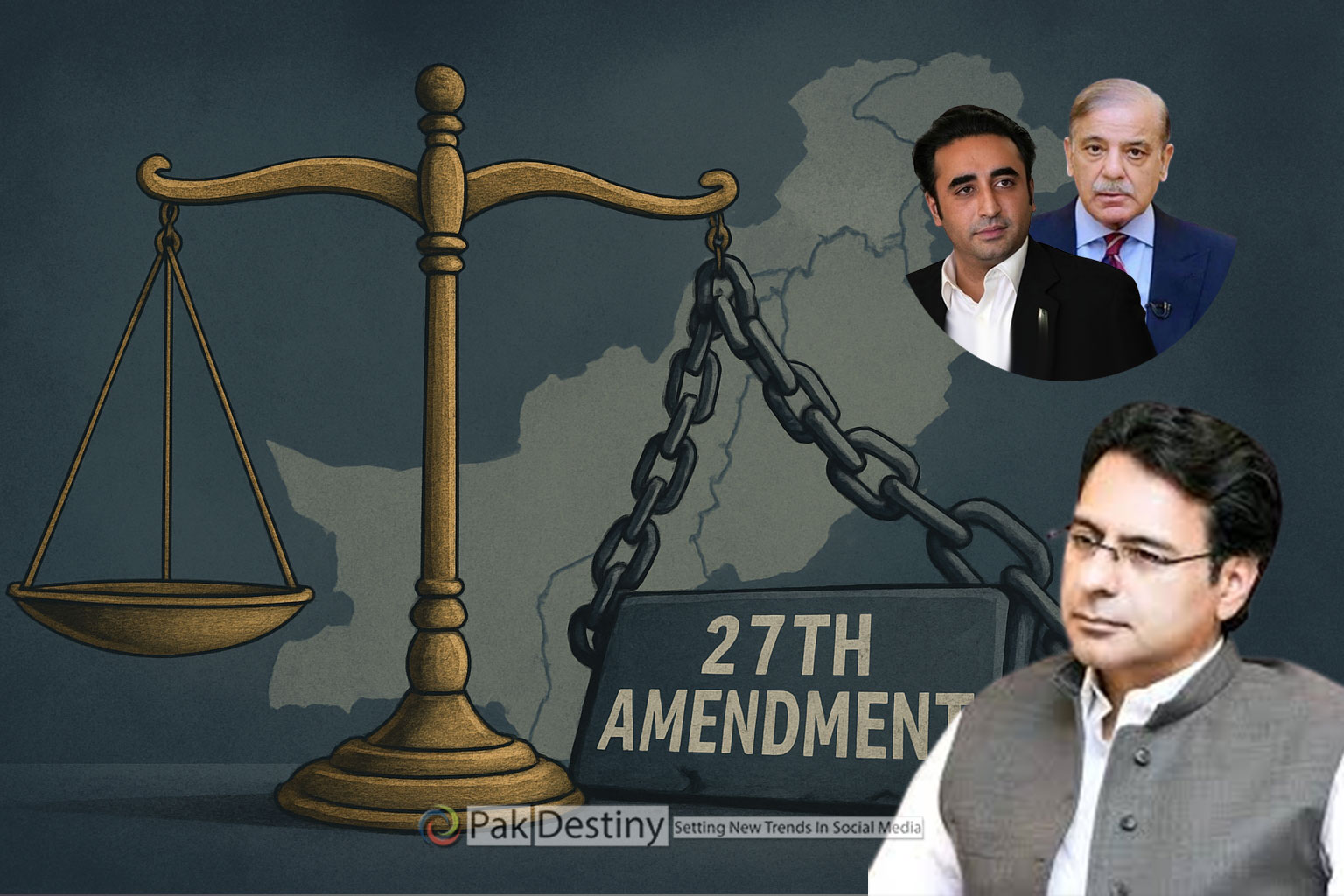
— Critics warn of rollback of judicial independence and provincial autonomy
By Zulqernain
Former federal minister and Pakistan Tehreek-i-Insaf (PTI) senior leader Moonis Elahi has launched a scathing attack on the government’s proposed 27th Constitutional Amendment, describing it as “the final nail in the coffin of the 1973 Constitution.”
In a post on X (formerly Twitter), Moonis Elahi warned that the amendment would “end the remaining independence of the judiciary, roll back provincial autonomy, and mark the demise of civilian supremacy.”
Mr Moonis further alleged that the “patwaris” — a reference to loyalists of the ruling Pakistan Muslim League-Nawaz (PML-N) — had “prepared to bury democracy once and for all.”
27 ویں ترمیم: 1973 کے آئین کے تابوت میں آخری کیل۔ عدلیہ کی رہی سہی آزادی ختم، صوبائی خودمختاری رول بیک، سویلین بالادستی کا اختتام۔ پٹواریوں نے جمہوریت کا جنازہ نکالنے کی تیاری کر لی۔
— Moonis Elahi (@MoonisElahi6) November 4, 2025
نیویارک کے پہلے مسلمان مئیر ظہران ممدانی کی جیت جمہوریت کی اعلی مثال ہے۔ نہ کوئی فارم 47، نہ مینڈیٹ کی چوری۔
— Moonis Elahi (@MoonisElahi6) November 5, 2025
Moonis Elahi’s comments came amid heated debate within political and legal circles over the government’s reported plan to establish a Constitutional Court, and some other amendments strike a financial balance between the federation and the provinces and also review power of the president regarding appointing the armed chiefs.
The move is seen by many as an attempt to dilute the powers of the Supreme Court and bring the judiciary under tighter executive control.
The controversy stems from the federal government’s apparent push to reshape Pakistan’s judicial architecture through a new constitutional amendment.
Sources within the ruling coalition suggest that the proposed 27th Amendment aims to create a permanent Constitutional Court, which would take over constitutional interpretation and fundamental rights cases from the Supreme Court.
The proposal has also exposed rifts within the ruling coalition itself. The Pakistan Peoples Party (PPP) — a key ally in the federal government — has publicly stated it will not support the 27th Amendment until its concerns are addressed.
PPP leaders privately express fears that the court’s creation could undermine provincial autonomy and reverse the spirit of the 18th Amendment, which devolved significant powers to the provinces.
Meanwhile, Jamiat Ulema-e-Islam-Fazl (JUI-F) chief Maulana Fazlur Rehman has also voiced opposition to the idea of a constitutional court, terming it “unnecessary” and “politically motivated.”
Observers point out that the renewed push for the 27th Amendment coincides with the near-total exclusion of the Pakistan Tehreek-e-Insaf (PTI) from parliamentary proceedings.
Since the controversial Form-47 government took power after the February elections, PTI’s representation has been reduced to near zero due to disqualifications, arrests, and a series of legal and administrative maneuvers.
Analysts believe this vacuum in the opposition benches has emboldened certain elements within the ruling structure — both political and non-political — to pursue constitutional engineering without meaningful scrutiny.
The timing of the proposed amendment also underscores the growing influence of the establishment in shaping the political and constitutional landscape.
Moonis Elahi’s statement appears to echo the concerns of a broader section of opposition leaders who see the amendment as part of a larger pattern of institutional rollback — where civilian authority, provincial rights, and judicial independence are being systematically eroded under the guise of “reforms.”
Within the legal fraternity, the reaction has been mixed but largely critical. Senior lawyers, including members of the Supreme Court Bar Association and Pakistan Bar Council, have warned that establishing a constitutional court would create parallel judicial hierarchies, leading to confusion, inefficiency, and political manipulation.
A Lahore-based senior lawyer commented, “Instead of strengthening the Supreme Court, the government wants to weaken it by creating a politically pliant institution that can legitimize controversial executive actions.”
Others argue that the 27th Amendment could further polarize the judiciary, which is already divided along ideological and institutional lines following years of confrontation between judges and the establishment.
The debate over the 27th Amendment represents more than a legal dispute; it marks a critical moment in Pakistan’s constitutional evolution.
As Moonis Elahi’s statement reverberates through political circles, it reflects a growing anxiety among opposition ranks that Pakistan is once again veering toward centralized authoritarianism — with parliament marginalized, courts subdued, and provinces stripped of autonomy.
If passed, the amendment could fundamentally alter the balance.






